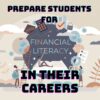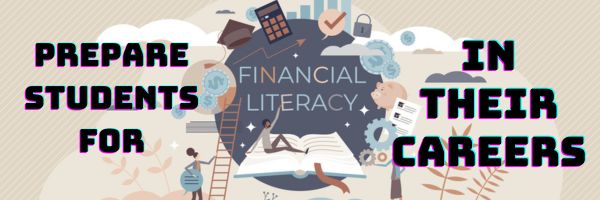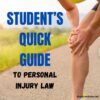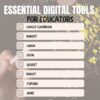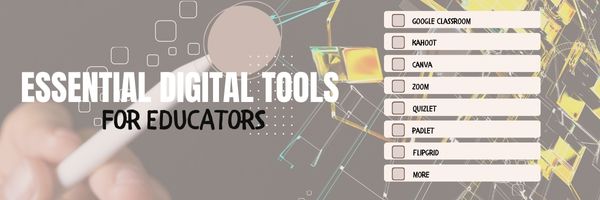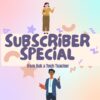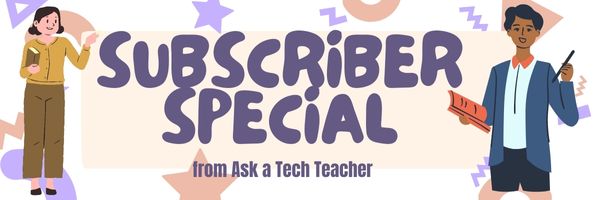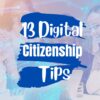Preparing Students for Future Careers with Soft Skills Training on Financial Decisions
Last summer, I helped my niece create a cookie stand. She learned not only about baking but how to budget for supplies, manage earnings, and communicate with customers, which taught her money management while boosting her confidence in handling real-life business scenarios. These are the soft skills associated with financial literacy. The Ask a Tech Teacher team has put them together into an article to remind students–and teachers what students should know when they leave high school:
Preparing Students for Future Careers with Soft Skills Training on Financial Decisions
Teachers hold many responsibilities outside regular education. These responsibilities include imparting knowledge and equipping our students with practical life skills beyond textbooks and exams. Financial literacy is one critical area that lies under our purview.
In today’s rapidly evolving job market, where our students can earn online while still in school, imparting these skills is more crucial than ever, and we must teach our students how to manage money effectively and make informed financial decisions.
So, how can we prepare our students for future financial stability? Let’s explore some innovative strategies below.
1. Hypothetical Small Businesses: From Idea to Execution
Imagine a classroom buzzing with entrepreneurial energy where students develop and execute small business ideas.
After they brainstorm business ideas, guide them to create business plans and simulate the launch of their small enterprises. This project-based approach fosters creativity and jones essential financial skills like the following:
- Budgeting: Your students will learn how to allocate business resources wisely; this includes creating a feasible startup cost and working out the marketing expenses and operational overheads. They will grapple with trade-offs real entrepreneurs grapple with; for example, they may have to do in-house marketing and direct the marketing budget to additional stock when demand is high.
- Cash flow management: As their “businesses” operate, your students will track income and expenses. Here, they may encounter cash flow challenges like delayed payments or unexpected costs, which will require them to strategize and prepare for such incidents.
- Profit and loss: Your students will also learn how to calculate profits and losses. Here, they will learn how to streamline their business to minimize losses by minimizing operational costs, switching suppliers, dropping low-moving items, and using other crucial business strategies.
2. Teaching Them About Different Types of Loans By Stimulating An SBA Loan
After you get the hypothetical small businesses going, the next financial lesson to introduce includes scaling their businesses using different financing methods. That includes introducing your students to the world of loans, specifically Small Business Administration (SBA) loans.
The first step is defining what they are. SBA loans are facilitated by approved SBA lenders and backed by the U.S. Small Business Administration. They allow small businesses to access larger loan amounts, benefit from extended repayment terms, and secure lower interest rates. Explain to them the pros and cons of SBAs compared to other loans.
Next, walk your students through getting an SBA loan and focus especially on giving them a clear overview of SBA loan requirements.
Here are a couple of things to cover:
SBA Loan Basics
Explain the purpose of SBA loans and discuss eligibility criteria, loan terms, and repayment schedules. The eligibility requirements for businesses seeking assistance from the Small Business Administration (SBA) include the following:
- Business type: The business must be for-profit.
- Geographic scope: It should operate within the United States or its territories.
- Financing limitations: The business must be unable to secure financing through other non-government means (excluding personal funds) as of August 1, 2023.
- Equity requirement: Sufficient equity is necessary.
- Size criteria: The business must meet the SBA’s definition of a “small business.”
- Eligible industry: The business should operate in an eligible industry.
- Repayment ability: Demonstrating the ability to repay the loan is essential, considering credit score, earnings, and equity or collateral.
Loan Application Process
Your students can use their businesses to seek out hypothetical SBA loans. They can fill out the loan application forms while considering factors like creditworthiness, collateral, and business viability.
While doing this, they can also engage in risk assessment as you encourage them to think critically. What if their hypothetical business faces economic downturns? How will they repay the loan?
3. Soft Skills Training: Go Beyond Numbers and Formulas
Financial literacy isn’t just about crunching numbers; it’s also about mastering soft skills. Core soft skills ensure that a business and brand are well received. These soft skills include problem-solving skills, teamwork, and effective communication.
You can create practical scenarios for each soft skill you want them to learn and have your students roleplay; for example, to help them develop better communication skills, you can have them:
- Pitching ideas: Teach students to articulate their business concepts persuasively and confidently. This is important because whether they’re courting investors or negotiating terms, communicating effectively and using the correct language and mannerisms will be instrumental to their business success.
- Client interactions: How businesses present their product to the general public is vital to ensuring brand receptiveness. You can teach this by roleplaying client meetings and teaching your students how to explain financial options to potential investors and simplify complex terms and corporate jargon.
4. Introduce Them To Business Resources: Guiding Students Toward Financial Wisdom
Introduce students to reputable business resources. Websites like the Small Business Administration (SBA) provide loan requirements, eligibility, and application process guidelines.
Kick things up a notchy by introducing financial literacy workshops where you invite guest speakers from your community – financial advisors, bankers, or successful entrepreneurs – to share insights. Their real-world stories will resonate with students.
Endnotes
By blending project-based learning, soft skills training, and practical resources, we can empower our students by equipping them with key skills they require to be financially competent adults. They’ll grasp financial concepts and develop the resilience, adaptability, and confidence needed to make good financial decisions.
So, let’s nurture their financial skillset, one budget, one loan simulation, and one entrepreneurial dream at a time. After all, these skills aren’t just for the classroom; they’re for life.
Here’s the sign-up link if the image above doesn’t work:
https://forms.aweber.com/form/07/1910174607.htm
Copyright ©2024 askatechteacher.com – All rights reserved.
“The content presented in this blog are the result of creative imagination and not intended for use, reproduction, or incorporation into any artificial intelligence training or machine learning systems without prior written consent from the author.”
Jacqui Murray has been teaching K-18 technology for 30 years. She is the editor/author of over a hundred tech ed resources including a K-12 technology curriculum, K-8 keyboard curriculum, K-8 Digital Citizenship curriculum. She is an adjunct professor in tech ed, Master Teacher, webmaster for four blogs, freelance journalist on tech ed topics, contributor to NEA Today, and author of the tech thrillers, To Hunt a Sub and Twenty-four Days. You can find her resources at Structured Learning.
Share this:
Personal Safety and Legal Rights: A Student’s Guide to Understanding Personal Injury Law
When a student at my school was injured in a sports event, it became painfully clear how little she and her family understood what their next steps should be. A friend put together this “A Student’s Guide to Understanding Personal Injury Law” to provide other students in similar situations with an overview of the essential concepts and real-world applications of personal injury law:
- the basics
- recognizing unsafe conditions
- Insurance Policies
- more
Personal Safety and Legal Rights: A Student’s Guide to Understanding Personal Injury Law
Accidents can happen anywhere. That includes educational settings. Therefore, as a student, understanding the basics of personal injury law is essential for safeguarding your rights and ensuring you’re prepared if mishaps occur.
This guide will equip you with the basic knowledge you need to navigate these challenges confidently. (more…)
Share this:
Grade Assignments with PDF Tools
- Getting started
- Grading
- Providing feedback
- Saving and sharing
Grade Assignments with PDF Annotation Tools
As online learning and virtual classrooms gain popularity, educators are turning to new technologies to improve their teaching methods. This shift has led to a significant increase in digital grading tools, which help streamline the evaluation process and provide timely, valuable feedback to students, aiding their academic success.
A particularly useful technology in this realm is PDF annotation. This tool helps educators with text highlighting in order to leave feedback. It also allows them to strike through errors and add detailed notes directly on the student’s work. This eliminates the need for downloading and re-uploading assignments, enabling in-depth commentary.
In this blog post, we’ll explore the features of PDF annotation tools and their capabilities to transform assignment grading and student feedback. (more…)
Share this:
How to Choose the Right Online Tutor for Your Child
With the increased popularity of online tutors, the Ask a Tech Teacher team has come up with some guidelines to help you select the right one for your child:
How to Choose the Right Online Tutor for Your Child
As many as a third of kids are given a leg up in their learning efforts by professional tutors, so there’s a high chance you’re considering this option for your child. Whether they are having trouble getting to grips with core concepts, or they need a little extra assistance with exam prep, there are all sorts of reasons to take this route.
What matters most in this context is picking a tutor who’s a suitable fit for the unique requirements of your youngster. With that in mind, here are some factors to weigh up as your search for an online tutor gets underway in earnest. (more…)
Share this:
21 SAT/ACT Prep Online Resources
Here are popular online resources to prepare for ACT and SAT tests (click for updated list):
- Albert Online — lots of SAT practice exams, including subject areas.
- College Board
- Kaplan Test Prep
- Khan Academy reading-writing-practice
- Mindsnacks SAT Vocabulary–a big part of succeeding on the SAT essay is knowing the right word
- Number2.com–for SAT, ACT, GRE
- Perfect Score Project--to prepare for SATs
- Prep Factory–for SATs, ACTs, other
- Quizlet–hundreds of SAT vocabulary prep flashcards
- UWorld SAT Prep
- Veritas Prep–free and fee tips, videos and more
SAT Exams
Here are some that specialize in SAT exams:
Share this:
We Honor July 4th in America
Like every year, I exuberantly celebrate America’s birthday. I’d say times are tough here in the US, but that seems to be true everywhere in the world. So, I won’t complain. I will enjoy the love of America as all of my international friends love their homeland.
[youtube https://www.youtube.com/watch?v=Ke4gRMowvQg]
This one–Chris Stapleton–4 Million views since Super Bowl 2023:
[youtube https://www.youtube.com/watch?v=tcs6HLKz_aQ][youtube https://www.youtube.com/watch?v=k4OsP4BsATw]
[youtube https://www.youtube.com/watch?v=p4kJ9sMDhaY]
[youtube https://www.youtube.com/watch?v=_ds3MvMUdNk]
Here’s the feel-good video for all patriots. If you missed this viral video from the Navy Women’s Lacrosse team, enjoy!
https://youtube.com/shorts/u-dsWFOiOIg?si=cKUCB-4A082Uo4zb
Share this:
14 Essential Digital Tools for Educators to Streamline Daily Activities
There are a lot to digital tools people swear are essential to educators. Here’s a list of fourteen put together by the Ask a Tech Teacher team. I use about half of them. How about you?
14 Essential Digital Tools for Educators to Streamline Daily Activities
In 2024’s fast-paced educational environment, teachers and all those in the academe face the daily challenge of managing their school or course’s efficiency. From spanning out schedules and lesson planning to grading, the responsibilities seem a never-ending cycle and quite overwhelming.
Thankfully, however, today’s advancements brought digital tools to help streamline all these school-related activities. They make educators’ lives a whole lot easier, aside from improving the learning experiences for their students.
Today, you can count on these tools to make educators’ lives more seamless once you get them working through digital routines.
Top 14 Educators’ Tools in 2024
Share this:
Subscriber Special: 20% Discount on Foundational Materials
Every month, subscribers to our newsletter get a free/discounted resource to help their tech teaching.
Over the next few weeks, we will be sharing details on our blog (Ask a Tech Teacher) about Structured Learning resources to get your new school year started. These are often collected into back-to-school survival kits. Purchase one of those with the coupon code:
Back-to-school Special Survival Kits
Get 20% off listed price.
Offer expires Sept. 15, 2024
Share this:
What You Might Have Missed in June–What’s up in July
Here are the most-read posts for the past month:
- The Future of Online Learning: Benefits and Strategies for Educators
- How to Teach Financial Literacy Using Real-World Examples
- How Virtual Information Sessions Are Changing K-12 Education
- Incorporating Monthly Giving Projects into STEM Curriculum: Inspiring the Next Generation of Philanthropists
- How Cloud Security Empowers Online Learning Platforms
- How to Help Students Run a Genius Bar
- June is Internet Safety Month
- World Environment Day: Living Responsibly with Nature
- 11 Online Resources About Animation
Here’s a preview of what’s coming up (these may change as scheduling adapts to reader needs): (more…)
Share this:
Top 13 Digital Citizenship Tips For Enhancing Online Safety
Navigating the internet is akin to exploring a lively city with its exciting opportunities and hidden dangers, where good digital citizenship provides the legal guidelines that ensure safe and respectful interactions. Imagine if your child or students are trying to explore that glitz safely? Here are tried-and-true ideas from the Ask a Tech Teacher team that provide good starting points to develop habits of vigilance when using the internet:
- create strong passwords
- two-factor authentication
- secure devices
- antivirus software
- avoid phishing scams
- more
Top 13 Digital Citizenship Tips For Enhancing Online Safety
Navigating the internet can be a bit like wandering through a bustling city, exciting but full of potential pitfalls. Good digital citizenship is all about making smart, safe, and respectful choices online, helping you make the most of this incredible resource while allowing billions of others to do the same.
As such, there are a handful of universally agreed-upon principles and best practices for being a good digital citizen. Here are the top 13 tips from the same, mainly pertaining to enhancing your online safety and well-being. (more…)

